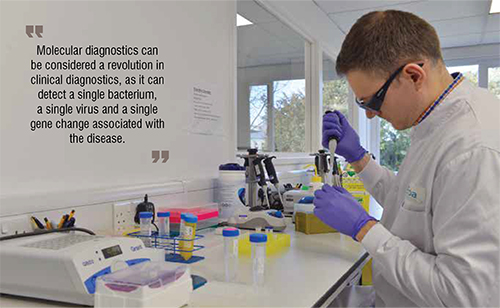As healthcare shifts towards- personalization and digitization, diagnostics allow individuals to receive vital information with increased accuracy, specificity, and speed. In a bid to get closer to the end user, manufacturers are leveraging data and building intelligence into their products. This practice places prevention ahead of treatment and cure, thereby giving patients greater control over their care.
The most important aspect of In-vitro Diagnostics (IVDs) is the role they play in delivering patient care and improving outcomes. Innovations in IVDs are resulting in faster, accurate testing and are allowing clinicians to target treatment more precisely and effectively, improving patient pathways and enabling earlier intervention. Many studies have shown that about 70 per cent of treatment decisions rely on diagnostic test reports. Besides this, innovators in the IT industry are finding ways to transform data available from clinical laboratories into actionable medical knowledge.
Moreover, people around the world are living longer, and have warmed up to the idea of DNA testing in health care. They also want to be able to track their conditions more closely and take control of when and where they receive diagnostic testing.
Molecular diagnostics can be considered a revolution in clinical diagnostics, as it can detect a single bacterium, a single virus and a single gene change associated with the disease. A growing trend in molecular diagnostics is Nex-Gen Sequencing (NGS). Here, an analysis of the genetic information from the sample will help diagnose a disease well in advance, even before a patient actually starts presenting symptoms of a disease. It can thus be used to detect levels of TB, malaria and other diseases which all the other tests would miss.
The sensitivity, speed and reduced cost per sample make it a highly attractive platform. In the near future, NGS will be considered by many laboratories for routine diagnostic use.
However, new technologies like these need to be made accessible and affordable. Currently these tests are restricted to specialised laboratories and are priced exorbitantly.
Advanced molecular diagnostic solution scan consolidate, automate, increase throughput and provide versatility for multiple molecular diagnostic applications. Solutions can now handle multiple sample types concurrently, as well as utilising engineering innovations to amplify the advances in multiplexing. This helps laboratories in rapid sample processing and also aids them in expanding their testing menu to include laboratory-developed or external infectious disease, respiratory and gastro assays.

In India, let’s take the example of tuberculosis (TB). There are simply not enough people being tested and even for the ones who are tested, there is a high probability of false results. This is because the tests being used are not sensitive enough to detect the disease accurately. This is particularly the case in children. Febrile diseases such as malaria, dengue, and chikungunya are difficult to distinguish as the viruses causing these diseases closely resemble each other. This is where molecular diagnostics can play a crucial role in accurate diagnosis of these diseases.
Here again, there is a need to make these tests accessible and easy to use so they can reach out to the interiors of the country.
TB Test
Erba Molecular is developing a cutting-edge, low cost TB system for small laboratories. This system offers flexibility, as it can be used for NGS sample preparation. Further, future HIV and other Blood Borne Virus (BBV) assays can be run on the same system. It is easy to use and comes with the following features:
• Fully-automated pre-filled cartridgebased sample extraction
• Wide throughput range of 1-80 tests per day with TAT <90 minutes
• Eliminates need for centrifugation, filtration or cartridge autoclaving
• Low training and user skill requirements.
It involves minimal user manipulation of challenging sputum samples and has an upfront heat-kill step for enhanced biosafety. Developed with a molecular technology using high-copy RNA and unique sample enrichment process, makes it highly sensitive for TBtests.
The Impact on Patient Care
Currently, when a patient presents symptoms of fever, doctors prescribe them antibiotics. In the long run, extended use of antibiotics leads to drug resistance. Molecular diagnostics helps in detecting the disease accurately, early on. As a result, doctors will be in a better position to direct therapeutics, according to the patient’s need.
Market Opportunity
The market opportunity is huge. Globally, the molecular diagnostics market has grown over 10per cent. However, it has hardly penetrated at all in India. Currently molecular diagnostics is available only in large reference labs and certainly not in medium or small labs. A lot more subsidies are required to promote the outreach of the molecular technologies and make them sustainable and thus profitable.
A lot of companies are introducing molecular diagnostics, however, they are unable to contain the cost and expand the reach. Erba Molecular (UK), a fully-owned subsidiary of Transasia Bio-Medicals is combining special technology that makes molecular diagnostics less complex with the infrastructure offered by Transasia, to introduce technologies that are customized to Indian needs. Thus, Erba Molecular can cater to the needs of affordable, Make in India products.
So, with Nex-Gen sequencing and the future technologies, the hope here is that one can get more information from patients so that they can be better informed of their treatment needs.

Overcoming Challenges
There is a lot of hype around molecular diagnostics and the expectations are high. People expect the tests to be excellent and our challenges are to get the clinical data, the review data and the confidence of the users so they recommend these tests. This is a genuine challenge and it relates to the regulatory framework.
Having a regulatory framework in place will help protect patients. Erba Molecular (UK) is engaged with the regulatory bodies to make sure our tests are as accurate, as economical and as valuable as possible. It is now essential to get people to understand molecular diagnostics, the value it brings to them and how to use the equipment. This is precisely why it is it is very important that innovators should offer technologies that are easy to adopt, even in small setups.
Another challenge is the optimum use of information. A simple molecular diagnostic test can provide a plethora of information, which can be quite overwhelming for the physician. To counter this, companies are now generating comprehensive and sophisticated databases, which will automatically give recommendations. For example, a person has disease X and needs to be treated with drug Y, and this is in progress at the moment. In this regard, there is a TB seek program which is collating all the different types of mutations associated with drug resistance and TB.
Need for Regulatory Intervention
Like for any other segment of diagnostics, regulatory intervention are imperative for molecular too. This is in order to ensure high quality products. It is important that manufacturers follow processes within the regulatory framework and acquire the necessary accreditations. For the nex-gen sequencing, the regulatory framework is still emerging.
Like for any other segment of diagnostics, regulatory intervention are imperative for molecular too. This is in order to ensure high quality products. It is important that manufacturers follow processes within the regulatory framework and acquire the necessary accreditations. For the nex-gen sequencing, the regulatory framework is still emerging.
Today, the impact of technology on innovation is bigger than ever. We are witnessing an evolution in the field of medical technology — one that is making diagnosis and treatments more proactive and efficient. While this has added accuracy and convenience for both doctors and patients, the Indian population is becoming more conscious towards their healthcare upkeep.
Right strategy and innovations in terms of diagnostic solutions will drive the growth in the future. Through our range of offerings, breadth of capabilities, reach, and an integrated network, we will continue to be the partner of choice for several diagnostic players.
Riding the Wave of Surging Trends
An informed public and increased demand for rapid disease identification have helped the in vitro diagnostics industry to flourish in recent years. The markets in India, Brazil and China are expected to grow at a rapid pace due to the high prevalence of infectious diseases in these countries. They are also witnessing an emerging trend for non-invasive prenatal testing, Next-Generation Sequencing (NGS), liquidbiopsy, and circulating tumour cells test. These trends are pushing medical device manufacturers to expand the current base of IVD technologies as well as to pursue work on developing new ones. The technologies that are most heavily influenced by these trends are point-of-care (POC), liquid biopsy, molecular diagnostics, and Artificial Intelligence (AI) and the Internet of Things (IoT) used in conjunction with in vitro diagnostics.